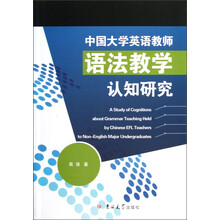中国大学英语教师语法教学认知研究

目 录内容简介
Chapter 1 Introduction
1.1 Preliminary Remarks
1.2 A Working Definition of Grammar
1.3 Rationales for the Present Research
1.4 Objectives of the Present Research
1.5 Significance of the Present Research
1.6 Organization of the Book
Chapter 2 A Review of L2 Grammar Teaching
2.1 Introduction
2.2 A Historical Glimpse of Ups and Downs of L2 Grammar
Teaching
2.2.I Grammar Teaching in the Methods-Oriented Era
2.2.2 Grammar Teaching in the SLA-Oriented Era
2.2.3 Summary
2.3 Teacher Language Awareness (TLA) in L2 Grammar
Teaching
2.3.1 An Interpretation of TLA
2.3.2 Impacts and Roles of TLA in L2 Grammar Teaching
2.3.3 Empirical Studies of TLA in L2 Grammar Teaching
2.3.4 Summary
2.4 Empirical Studies of L2 Grammar Teaching from the Perspective of
Teacher Cognition
2.4.1 Surveys of 12 Teachers' Beliefs about Grammar
Teaching
2.d.2 Surveys of L2 Teachers' Explicit Grammatical
Knowledge
2.4.3 Studies of the Relationships between L2 Teachers'
Cognitions and their Practices of Grammar Teaching
2.5 Summary
Chapter 3 A Research Framework of L2 Teacher Cognition
3.1 Introduction
3.2 An Exploration of the Construct of Teacher Cognition
3.2.1 Definitions of Teacher Cognition
3.2.2 Content of Teacher Cognition
3.2.3 Theoretical Underpinnings of Teacher Cognition
3.2.4 Characteristics of Teacher Cognition
3.2.5 Actualizations of Teacher Cognition
3.3 A Research Model of L2 Teacher Cognition
3.3.1 Borg's Research Model of Teacher Cognition in
Mainstream Education
3.3.2 A Modified Research Model of L2 Teacher Cognition
Based upon Borg's
3.3.3 Factors Interacting with L2 Teacher Cognition
3.4 A Research Model of L2 Teachers' Cognitions about
Grammar Teaching
3.5 Summary
Chapter 4 Research Design
4.1 Introduction
4.2 Research Setting
4.3 Research Questions
4.4 Instruments
4.4.1 Teachers' Beliefs Questionnaire
4.4.2 Teachers' Grammatical Knowledge Questionnaire
4.4.3 Teachers' Common Practices Questionnaire
4.4.4 Students' Beliefs Questionnaire
4.4.5 Supplements to the Four Questionnaires
4.5 Pilot Study
4.6 Participants
4.6.1 Participant Teachers
4.6.2 Participant Students
4.7 Data Collection
4.8 Data Analysis
4.8.1 Validating the Data
4.8.2 Analyzing Quantitative Data
4.8.3 Analyzing Qualitative Data
4.9 Summary
Chapter 5 Results and Discussion
5.1 Introduction
5.2 Teachers' Beliefs about Grammar Teaching
5.2.1 An Overview of Teachers' Beliefs about Grammar
Teaching
5.2.2 Teachers' Individual Differences and their Beliefs about
Grammar Teaching
5.2.3 Sources of Teachers' Beliefs about Grammar
Teaching
5.3 Teachers' Knowledge of Grammar
5.3.1 An Overview of Teachers' Grammatical Knowledge
5.3.2 Teachers' Individual Differences and their
Grammatical Knowledge
5.3.3 Distributional Characteristics of Teachers'
Grammatical Knowledge
5.4 Relationships between Teachers' Cognitions and their
Common Practices
5.4.1 Relationships between Teachers' Beliefs and their
Common Practices of Grammar Teaching
5.4.2 Relationships between Teachers' Grammatical
Knowledge and their Common Practices of Grammar
Teaching
5.5 Relationships of Teachers' Beliefs and Common Practices
with their Students' Beliefs about Grammar Learning
5.6 Summary
Chapter 6 Implications
6.1 Introduction
6.2 Implications for L2 Grammar Teaching and its Research
6.3 Implications for L2 Teacher Educational Programs
6.4 Implications for L2 Teachers' Self-Development
6.5 Implications for Contextual Improvem.ent of College English
Teaching
6.6 Summary
Chapter 7 Conclusion
7.1 A Summary of Major Findings
7.2 Limitations and Suggestions for Further Research
7.3 Concluding Remarks
Bibliography
1.1 Preliminary Remarks
1.2 A Working Definition of Grammar
1.3 Rationales for the Present Research
1.4 Objectives of the Present Research
1.5 Significance of the Present Research
1.6 Organization of the Book
Chapter 2 A Review of L2 Grammar Teaching
2.1 Introduction
2.2 A Historical Glimpse of Ups and Downs of L2 Grammar
Teaching
2.2.I Grammar Teaching in the Methods-Oriented Era
2.2.2 Grammar Teaching in the SLA-Oriented Era
2.2.3 Summary
2.3 Teacher Language Awareness (TLA) in L2 Grammar
Teaching
2.3.1 An Interpretation of TLA
2.3.2 Impacts and Roles of TLA in L2 Grammar Teaching
2.3.3 Empirical Studies of TLA in L2 Grammar Teaching
2.3.4 Summary
2.4 Empirical Studies of L2 Grammar Teaching from the Perspective of
Teacher Cognition
2.4.1 Surveys of 12 Teachers' Beliefs about Grammar
Teaching
2.d.2 Surveys of L2 Teachers' Explicit Grammatical
Knowledge
2.4.3 Studies of the Relationships between L2 Teachers'
Cognitions and their Practices of Grammar Teaching
2.5 Summary
Chapter 3 A Research Framework of L2 Teacher Cognition
3.1 Introduction
3.2 An Exploration of the Construct of Teacher Cognition
3.2.1 Definitions of Teacher Cognition
3.2.2 Content of Teacher Cognition
3.2.3 Theoretical Underpinnings of Teacher Cognition
3.2.4 Characteristics of Teacher Cognition
3.2.5 Actualizations of Teacher Cognition
3.3 A Research Model of L2 Teacher Cognition
3.3.1 Borg's Research Model of Teacher Cognition in
Mainstream Education
3.3.2 A Modified Research Model of L2 Teacher Cognition
Based upon Borg's
3.3.3 Factors Interacting with L2 Teacher Cognition
3.4 A Research Model of L2 Teachers' Cognitions about
Grammar Teaching
3.5 Summary
Chapter 4 Research Design
4.1 Introduction
4.2 Research Setting
4.3 Research Questions
4.4 Instruments
4.4.1 Teachers' Beliefs Questionnaire
4.4.2 Teachers' Grammatical Knowledge Questionnaire
4.4.3 Teachers' Common Practices Questionnaire
4.4.4 Students' Beliefs Questionnaire
4.4.5 Supplements to the Four Questionnaires
4.5 Pilot Study
4.6 Participants
4.6.1 Participant Teachers
4.6.2 Participant Students
4.7 Data Collection
4.8 Data Analysis
4.8.1 Validating the Data
4.8.2 Analyzing Quantitative Data
4.8.3 Analyzing Qualitative Data
4.9 Summary
Chapter 5 Results and Discussion
5.1 Introduction
5.2 Teachers' Beliefs about Grammar Teaching
5.2.1 An Overview of Teachers' Beliefs about Grammar
Teaching
5.2.2 Teachers' Individual Differences and their Beliefs about
Grammar Teaching
5.2.3 Sources of Teachers' Beliefs about Grammar
Teaching
5.3 Teachers' Knowledge of Grammar
5.3.1 An Overview of Teachers' Grammatical Knowledge
5.3.2 Teachers' Individual Differences and their
Grammatical Knowledge
5.3.3 Distributional Characteristics of Teachers'
Grammatical Knowledge
5.4 Relationships between Teachers' Cognitions and their
Common Practices
5.4.1 Relationships between Teachers' Beliefs and their
Common Practices of Grammar Teaching
5.4.2 Relationships between Teachers' Grammatical
Knowledge and their Common Practices of Grammar
Teaching
5.5 Relationships of Teachers' Beliefs and Common Practices
with their Students' Beliefs about Grammar Learning
5.6 Summary
Chapter 6 Implications
6.1 Introduction
6.2 Implications for L2 Grammar Teaching and its Research
6.3 Implications for L2 Teacher Educational Programs
6.4 Implications for L2 Teachers' Self-Development
6.5 Implications for Contextual Improvem.ent of College English
Teaching
6.6 Summary
Chapter 7 Conclusion
7.1 A Summary of Major Findings
7.2 Limitations and Suggestions for Further Research
7.3 Concluding Remarks
Bibliography
目 录内容简介
语法教学是外语教学研究的一个重点,但目前的研究多以学习者为调查对象,忽略了教师个人对教学的认知。其实,从本质上讲,外语教学是一种高度复杂的认知行为,教师对教学有自己的知识、观念、看法。《中国大学英语教师语法教学认知研究》样本大、数据形式多样,其发现对外语语法教学理论与实践、外语教师教育、外语教师自身专业发展、我国大学英语教学的环境改善等多个方面具有较大启示。
比价列表
暂无价格数据。
公众号、微信群
 缺书网
缺书网微信公众号
 扫码进群
扫码进群实时获取购书优惠

